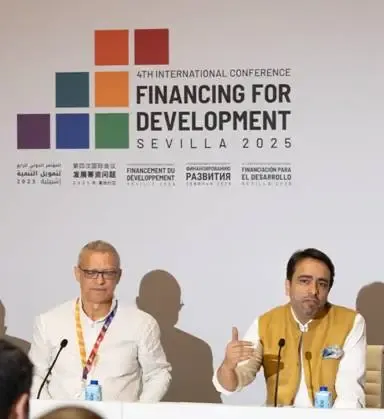Is India Institutionalising Outcome-Based Financing for Skilling?

Synopsis
Key Takeaways
- India is institutionalising outcome-based financing for skilling.
- Public, philanthropic, and private sectors are collaborating to drive impact.
- Models like Skill Impact Bond and Project AMBER are key examples.
- The initiative aligns with global development goals.
- Strategic discussions with international stakeholders are ongoing.
New Delhi, July 4 (NationPress) Jayant Chaudhary, the Minister of State for Skill Development and Entrepreneurship, stated on Friday that India is not merely testing out outcome-based financing but is also establishing it as a fundamental framework to create a robust and inclusive ecosystem for skilling.
During a high-level panel convened by the OECD and Impact Alliance at the Fourth International Conference on Financing for Development (FfD4) in Spain, the minister remarked, “Initiatives like the Skill Impact Bond and Project AMBER exemplify how public funds, philanthropic investments, and private capital can unite to generate measurable social impact on a large scale.”
Chaudhary was part of an Indian delegation led by Union Finance Minister Nirmala Sitharaman in Spain.
He joined global dignitaries to represent India at a high-level panel titled ‘Accelerating SDG Impact through Outcomes-Based Financing’.
This session emphasized India's role in aligning development finance with tangible results, especially in the domains of skills, women's empowerment, and livelihoods.
The panel featured senior officials and ministers from various countries, including Colombia, South Africa, Kenya, Norway, Turkey, Canada, Sierra Leone, and the United Kingdom.
Key representatives from major multilateral organizations such as the World Bank and the United Nations Population Fund also took part.
The Indian minister conducted several bilateral discussions with key international players during the FfD4 event.
He explored how the OECD's vast knowledge of data systems and impact measurement frameworks could support India's outcomes financing initiatives with OECD Deputy Secretary-General Mary-Beth Goodman.
Another productive discussion with Kate Hampton, CEO of CIFF, revolved around the $14.4 million skill impact bond, the importance of employer involvement, and data integration.
Moreover, he engaged in strategic conversations about unlocking private capital for large-scale impacts in employment and entrepreneurship with Tom Hall, CEO of the UBS Optimus Foundation, and Richard Hawkes, CEO of the British Asian Trust.
The minister reiterated India's readiness to collaborate with international partners to scale these models, echoing Finance Minister Nirmala Sitharaman's keynote speech at FfD4, which highlighted outcome-based funding as crucial for fostering sustainable and impactful growth.









